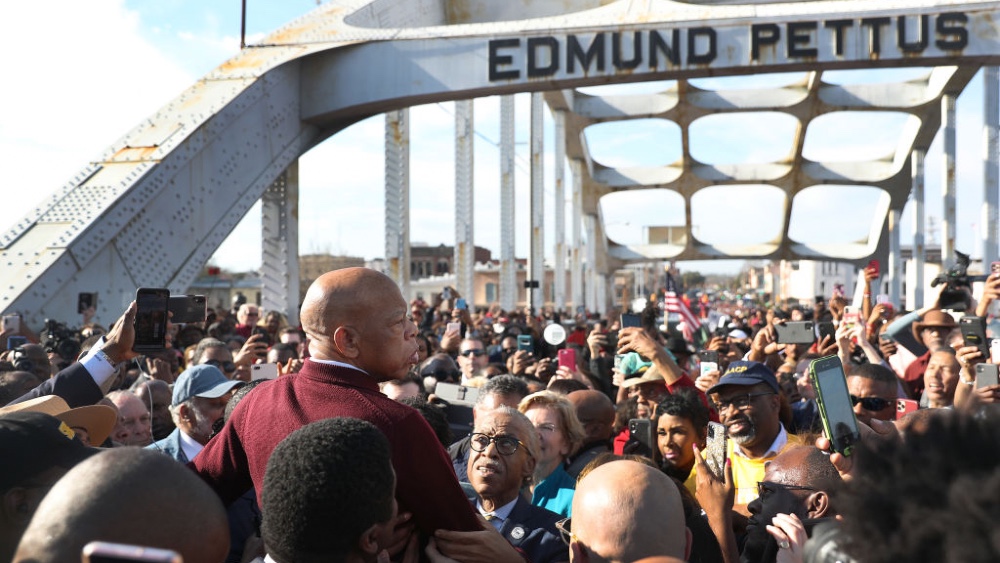If you’re interested in sharing your opinion on any cultural, political or personal topic, create an account here and check out our how-to post to learn more.
____
I first crossed the Edmund Pettus Bridge in 2009. Linking arms with Winnie Mandela, we walked together from Brown Chapel to the other side of the bridge, tracing the footsteps of those who walked for justice before us. We rejoiced together in the jubilee — in the religious, soul-filling celebration that Bloody Sunday has come to represent for many in the Black community. We reflected on the struggles we were still walking for decades later — voting rights, D.C. statehood, Black political representation. The list goes on.
As we walked, I noticed Winnie Mandela wearing high heels to make her way across the Alabama River. When I asked how she could walk such a long distance in heels, she looked at me and said: "The road to justice is long. If I worry about my 80-year-old feet, so much will be left behind."
Her words left me feeling simultaneously small and ready — humbled by the struggle each step across the bridge represents. It’s a feeling I muster everyday as I work to continue the legacy of Congressman John Lewis through my roles as the founder of the Black Male Voter Project and member of Just Democracy, a coalition struggling for structural democracy reforms. I use the word struggle, not fight, intentionally. Congressman Lewis taught us that justice is struggle — it is continuous, restless and constantly moving. The struggle for civil and human rights never stops.
The majority Black and brown residents of D.C. know this all too well. Living in the shadow of our nation’s Capitol, they are in the depths of a struggle for equal access to democracy. Residents of D.C. live only steps from the halls of power but have no voting representation in those halls. They pay federal taxes but have no say over how the dollars are spent. They serve in the military to defend American democracy abroad but have no access to it at home.
In 1993, as the House of Representatives prepared to vote for the first ever D.C. statehood bill, Congressman Lewis delivered an impassioned speech on the House floor to remind members of the very same message he delivered in Selma in 1965. He said: “One man, one vote.” He continued: “I rise in support of D.C. statehood. I rise in support of what is fair. It is not right that we have to be here debating whether to give American citizens living right here in the shadow of the Capitol representation in Congress. The time is now to do what is fair, what is right.”
Over 56 years after Bloody Sunday and 28 years after Congressman Lewis’s speech, more than 700,000 mostly Black and brown residents in D.C. remain locked out of equal representation. The injustice harkens back to a South of my nightmares. Denying voting rights to a majority Black and brown community is a relic of our Jim Crow South — a constant reminder that our struggle for justice requires Black Americans to secure rights so fundamental, they are enshrined in the constitution.
This weekend, as we recognize, rejoice and reflect on the anniversary of Bloody Sunday, we also remember the 14 people who were brutally murdered by the police in their struggle for justice. As May 25 approaches, we’ll remember George Floyd and the racial justice protests across the globe his humanity inspired. As June 1 nears, we’ll remember the residents of D.C. who were tear gassed by the Trump Administration for peacefully protesting in their own home, without protection from state leadership.
We are living through our generation’s Bloody Sunday — we’re in the middle of a mammoth moment in the long, continuous struggle for justice. In between the new anniversaries soon to be archived by history is where the struggle for justice continues.
Thanks to relentless advocacy, D.C. statehood is closer than ever before to passing in both chambers of Congress. Starting on March 11, the House of Representative will once again hear testimony in support of D.C. statehood. We need to rise up to honor the legacy and memory of Congressman Lewis, and make the history we failed to make in 1993. We need to call our Senators on behalf of the residents of D.C. — who have no Senators to call — and ask them to support the struggle for D.C. statehood. We cannot sit idle.
It’s time to make good trouble — it’s time to make D.C. the 51st state with 51 votes in the Senate. We must rise together in support of enfranchising the residents of D.C. and securing equal voting representation for all Americans. Whether you live in Selma or Washington, we are all obligated to advocate for communities we don’t belong to, because as Martin Luther King Jr. once said, “injustice anywhere is a threat to justice everywhere.”
____
